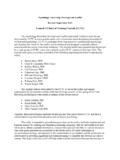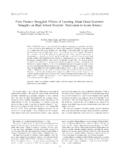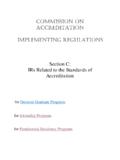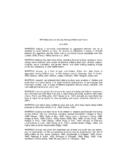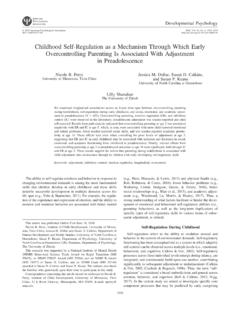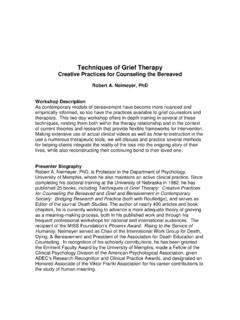Transcription of Points of Convergence and Divergence Between Existential ...
1 The Humanistic Psychologist, 43: 40 53, 2015. Copyright # Division 32 (Humanistic Psychology) of the American Psychological Association ISSN: 0887-3267 print/1547-3333 online DOI: INTERNATIONAL CONTRIBUTIONS. This article is intended solely for the personal use of the individual user and is not to be disseminated broadly. This document is copyrighted by the American Psychological Association or one of its allied publishers. Points of Convergence and Divergence Between Existential and Humanistic Psychology: A Few Observations Christine N. Winston Women's Christian College, Chennai, India Existential and humanistic approaches to the study of human behavior are often integrated into one, The Existential -Humanistic Approach, primarily because the two approaches are phenomenological in their orientations.
2 However, despite the shared emphasis on subjectivity, authenticity, and freedom, a number of differences exist Between the approaches. In this article, I articulate Points of Divergence Between the two approaches as reflected in their subjects of inquiry, ontological positions, temporal orientations, therapeutic goals, growth motivators, and conceptualizations of the good life. The differences under- score the uniqueness of the each approach as well as the complementarity of the two approaches. Existential and humanistic approaches to the study of human behavior are often merged into one, The Existential -Humanistic Approach, (Bugental & Bracke, 1992; Jones-Smith, 2012). because the two approaches are considered to be maximally similar and minimally different (Corey, 2005; Hoffman, 2006).
3 Indeed, Sartre (1945) proclaimed, Existentialism is a Human- ism'' (p. 1). Accordingly, Flynn (2006) has argued that existentialism is a humanistic philosophy because it emphasizes the meaning-making capacity of a person in an inherently meaningless world; conversely, humanistic psychology is rooted in and influenced by Existential thought (Bugental, 1963; Stumm, 2008). Efforts to reinforce the overlap Between the two approaches have resulted in a widespread endorsement and establishment of an integrated Existential - humanistic approach, readily observable in textbooks on introductory psychology and counselling psychology. It is noteworthy, however, that crucial Points of Divergence exist Between the two theoretical orientations; and that articulation of these differences is necessary to explicate that the integration of the two approaches is justified on the basis of similarities Correspondence should be addressed to Christine N.
4 Winston, M. Phil, Department of Psychology, Women's Christian College, 25 (Old no: 47), Srinivasa Nagar Main Road, Koyambedu, Chennai 600 107, India. E-mail: Existential AND HUMANISTIC PSYCHOLOGY 41. rather than synonymity. Accordingly, one can endorse the Existential tradition (but not humanistic), the humanistic tradition (but not Existential ), or an integrated Existential - humanistic orientation. Existential AND HUMANISTIC PSYCHOLOGY: A THEMATIC COMPARISON. Points of Convergence This article is intended solely for the personal use of the individual user and is not to be disseminated broadly. This document is copyrighted by the American Psychological Association or one of its allied publishers. A phenomenological orientation. Theorists who advocate the integration of Existential and humanistic approaches draw on the similarities Between the two approaches such as their shared emphasis on freedom, lived experience, and subjectivity (Hoffman, 2006).
5 In other words, both Existential and humanistic psychology are phenomenological in their orientations (Corey, 2005; Jones-Smith, 2012) valuing subjective experience over objective reality. Accordingly, the two approaches have been jointly referred to as the phenomenological approach'' (Jones-Smith, 2012; Misiak & Sexton, 1973). Consistent with such an orientation, existentialists and humanists tend to be skeptical about man's capacity to objectively experience and understand reality; the influence of one's subjectivity, even in the hard sciences, is considered to be inevitable. Bugental (1963), for instance, has observed: Physics itself has found that it must move beyond logical positivism .. attention to process and the experimenter's interconnection with the experiment are beginning to be recognized as essential to the further development of pure physics.
6 How much more pertinent are they to psychology. (p. 564). Kierkegaard (1846=1992), in his satirically titled book, Concluding Unscientific Postscript, rejects the possibility of finding truth through scientific,'' objective, or empirical means;. truth,'' he contends, is subjectivity'' (p. 278). In accordance with such a radically phenom- enological orientation, Rogers (1961) considers subjective experience rather than reason or objective'' experimentations with reality to be a surer approximation of truth. It is this orga- nismic valuing process that Rogers (1961) considers to be an essential sign of personal growth: Experience is, for me, the highest authority. The touchstone of validity is my own experience. No other person's ideas, and none of my ideas, are as authoritative as my experience.
7 It is to experience that I must return again and again, to discover a closer approximation to truth as it is in the process of becoming in me. (p. 23, italics in original). Accordingly, in differentiating Between the phenomenology implicit in Existential and humanist thought, Stumm (2008) notes that Rogers is more radical than his Existential counterparts in explicating the validity of a person's phenomenological experience: Rogers supersedes in this respect many of the Existential therapists who are often preoccupied with their frame of reference (for example, that clients should be worried about certain ultimate concerns'), though they consider phenomenology as an indispensable fundamental of an Existential attitude. (p. 10). 42 WINSTON. The existentialists, on the other hand, are divided on the subject of subjectivity.
8 Heidegger (1927=. 1962), for instance, dismissed Cartesian dualisms ( , subject vs. object), and emphasized the inextricability of the Being and the world; hence, the hyphenated being-in-the-world. Sartre (1956), however, contended that the Being is ontologically estranged from the world; and that all that is available to the individual is one's subjective experience and the freedom to create meaning out of nothingness. Although the phenomenologies of Heidegger (1927=1962) and Sartre (1956) are similar in that they are opposed to radical positivism, Heidegger's hermeneutic phenomenology This article is intended solely for the personal use of the individual user and is not to be disseminated broadly. differs from Sartre's Existential phenomenology, in that all meaning-making is understood as occur- This document is copyrighted by the American Psychological Association or one of its allied publishers.
9 Ring within the context of one's socio-cultural situation (the they;'' Heidegger, 1927=1962, p. 253). The quest for authenticity. Authenticity is a recurrent theme in Existential and humanistic literature; and has been variously labelled by different authors. Although there is much contro- versy, especially in the Existential circles, as to whether authenticity is an indication of psycho- logical health when compared to inauthenticity, Existential and humanistic therapists seek to help individuals live more authentically. Rogers (1961), for instance, considered psychotherapy to be the process through which a person is facilitated to be[come] the self that one truly is'' (p. 163). Maslow (1987) also believed that a person must be whatever one can be if he or she is to be at peace with oneself.
10 These ideals of authenticity can be traced back to Existential philosophers such as Kierkegaard, who wrote, Be the self that one truly is'' (Kierkegaard, 1849=1941, p. 18) and Nietzsche who observed, you should become who you are'' (Nietzsche, 1882=. 2008, p. 152). Heidegger's (1927=1962) conceptualization of authenticity and inauthenticity (in contrast to Sartre's bad'' faith), however, are considered to be value-neutral concepts. Inauthenticity or conformity to the they'' can also be adaptive because it provides a structure of predetermined meanings within which the Dasein exists and operates. Conversely, authen- ticity necessitates the seizing of one's Being, to become more fully a being-in-the-world and to relate more authentically to the (entities in the) world.


